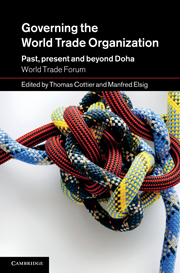Book contents
- Frontmatter
- Contents
- List of figures
- List of tables
- Notes on Contributors
- Preface
- List of abbreviations
- 1 Introduction
- PART I Setting the stage
- PART II Boundaries
- PART III Emerging and established powers
- PART IV Weaker actors
- 8 Developing countries and monitoring WTO commitments in response to the global economic crisis
- 9 Exploring the limits of institutional coherence in trade and development
- PART V The consensus principle
- PART VI Quo vadis?
- Index
- References
8 - Developing countries and monitoring WTO commitments in response to the global economic crisis
Published online by Cambridge University Press: 07 September 2011
- Frontmatter
- Contents
- List of figures
- List of tables
- Notes on Contributors
- Preface
- List of abbreviations
- 1 Introduction
- PART I Setting the stage
- PART II Boundaries
- PART III Emerging and established powers
- PART IV Weaker actors
- 8 Developing countries and monitoring WTO commitments in response to the global economic crisis
- 9 Exploring the limits of institutional coherence in trade and development
- PART V The consensus principle
- PART VI Quo vadis?
- Index
- References
Summary
Introduction
The WTO provides three critical services to the international trading system: a forum for multilateral negotiations, an apparatus to mediate the neutral arbitration of trade-related disputes between Members, and the illumination of members' changes to policies that affect foreign commercial interests. And yet, discussions of reform to the WTO system rarely address the third pillar of monitoring and transparency. This chapter examines the issue of information generation and the role of surveillance in the WTO system.
As motivation, one of the fundamental contributions of the WTO system's architecture is that it allows for substantial monitoring of changes to the national policies that have an impact on the conditions of foreign market access and hence, the flows of international trade. The WTO architecture has resulted in a system of rules as well as reporting requirements that makes it possible to transmit information concerning how one Member's policy changes are expected to affect the foreign market access interests of exporters in other WTO Member economies. Monitoring may have never been more important for the sustainability of the rules-based trading system than during the height of the global economic crisis in 2008–2009.
This chapter addresses a number of questions related to the monitoring of the foreign market access interests of exporters in developing countries – especially those with profit margins so small relative to the gains from enforcement – most unlikely to devote the private resources to cover monitoring costs themselves.
- Type
- Chapter
- Information
- Governing the World Trade OrganizationPast, Present and Beyond Doha, pp. 157 - 187Publisher: Cambridge University PressPrint publication year: 2011
References
- 2
- Cited by



